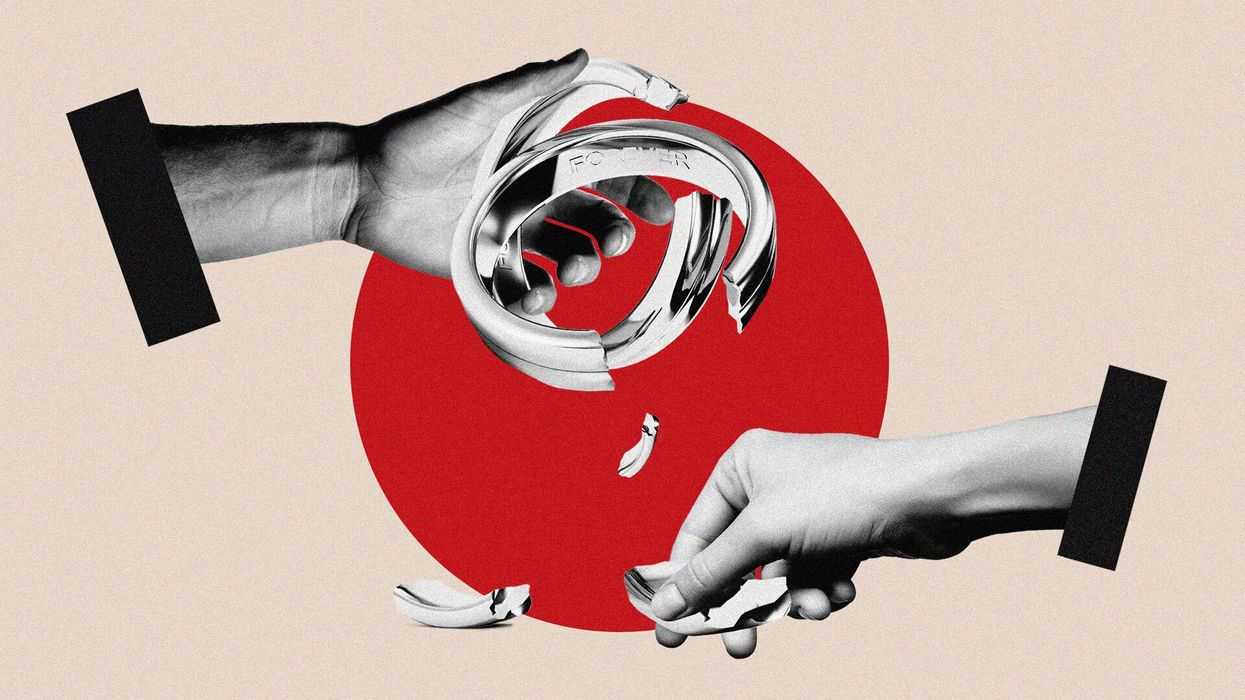Is Marital Hate Really “Normal”?
Exploring the phenomenon of so-called “normal” marital hate and asking the important questions like: Are straight people okay?

When I first heard the term “marital hate” on a podcast, I laughed out loud. I thought the host invented the phrase out of hyperbolic flair, but was stunned to learn it’s a well-documented phenomenon. The beauty of the term lies in its secret ubiquity: everyone who hears it seems to know exactly what it means. For years it seemed like every sitcom painted the same picture of marriage: cranky husband comes home to his “nagging” wife, she’s doing [insert domestic task] and recoils at his touch. The sentiment was always the same: marriage is a sexless, hostile environment, where the best you can hope for is a comfortable pattern of needling banter.
Last year, celebrity couples counselor Terrance Real popularized the term “normal marital hatred” in his Goop-approved book Us. Yes, according to Real, marital hatred is “normal.” What does this look like? Turns out, it looks like straight people are losing their minds on TikTok. When I started discussing “marital hate,” my friends started sending me TikToks—dozens of pithy, upbeat videos made by people who hate their spouse’s guts. They ranged from innocent behavior—one woman saying, “When I am mad after almost 20 years, I wake him in the middle of the night telling him I heard a noise outside so he gets up and goes and checks”—to more concerning trends like men pretending to smother their wives in their sleep. Chilling. Since my algorithm is mostly farm animals and BLACKPINK dance tutorials, this was all news to me. To me, spousal hatred was more of a “Punch and Judy” cliché, but I was shocked to see it was not only widespread, but a throughline in hundreds of TikTok trends. So to paraphrase the line I hear most in cinematic break-up scenes: “How did we become these people?”
In Real’s interview with the New York Times, he says we live “in a culture of toxic individualism.” His theory is that people are not equipped to deal with the disillusionment of marriage, and their individualistic attitudes prevent them from adequately repairing the relationship after disputes. This causes a build-up of unresolved resentments that manifest in all the light-hearted, homicidal TikTok content listed above. In an attempt to wrap my head around the phenomenon, I asked Ms. Kelsey V. Eisen, Esq.—attorney, former divorce lawyer, and happily married woman—to unblur the boundary between “normal marital hate” and grounds for divorce.
Over the phone, I introduced her to the term “normal marital hate” and she immediately reacted with, “No. We should not be normalizing marital hatred. No degree of hatred should exist in a relationship.” After working in family law, Eisen has a zero-tolerance policy for hatred. She’s watched marital hate fuel not only countless divorces, but horrific domestic violence crimes. It’s not just a cute or snarky TikTok trend, but something much more sinister when you’ve seen the police reports. “It can be normal to feel like you hate someone in the heat of an argument, like the way you feel when you’re a teenager fighting with your parents. But if you find yourself regularly hating your partner, even in calm moments, that’s a serious problem.”
After working in family law, what Eisen saw was less explosive, consistent hate, and more simmering resentment–much like the normalized animosity on TikTok–that one day boiled over. What does a boiling point look like? “The iCloud is the MVP of divorces,” she cautions. “In one case, the family iPad was connected to the husband’s iCloud account.” (Anyone sees where this one is going?) “One day the kids are watching Cocomelon on the family iPad and nudes from the dad’s mistress, a woman he met in AA, started popping up on the screen.” Oopsie doopsie! As you can imagine, this was the last straw for his wife who had put up with multiple infidelities before—but without the children being exposed to softcore adult content. In this particular case, as in most situations, this particular transgression was simply the straw that broke the camel’s back, Eisen explains. “A lot of women will endure years of verbal, sexual, [and] emotional abuse from a husband, but when it comes to affecting their children, that’s where they draw the line.” I don’t know why I thought writing about “marital hatred” wouldn’t be completely devastating, but it certainly is. Brace yourself, it’s only going to get worse.
Both Eisen and Mr. Real seem to concur that disillusionment, disappointment, and resentment are at the core of most dysfunctional relationships. When it comes to both couples therapy and divorce, Real and Eisen both noted that it is typically the woman who seeks professional help. Eisen says, “For a number of reasons, women often find themselves responsible for the emotional maintenance of the relationship. When they file for divorce it’s usually because they petitioned for years, asking their spouse to make changes. Ironically, even with years of being asked to change, most men see divorce as totally out of the blue.” Since we’re talking about straight couples here, let’s get to the core of most of the toxic behavior: misogyny.
“A lot of men expect marriage to be easier,” Eisen explains. “And let’s be honest: a lot of men expect to be taken care of by their wives.” Straight men are often looking for not only a wife, but a surrogate mommy. They thought marriage would make their lives easier, and when it turned out to be a lot of work, they got resentful. Before you come at me with the #NotAllMen shit, here’s a fun fact: In heterosexual marriages, when a wife gets a terminal diagnosis, it is so common that men will abandon their partners that doctors will inform straight, partnered female patients of this statistical likelihood to emotionally prepare them for what is to come. Statistically, most women will stay with their husbands if they get a terminal diagnosis. In line with Terry Real’s breakdown of most relationships: toxic individualism and entitlement are at the core of marital discord. On the other hand, women seem to be more realistic from the get-go. A friend recently sent me a tweet that read, “You want me to get a husband?? The thing that killed everyone on dateline???” A 2017 study reported that 61% of women in the UK are happier being single compared to 49% of men. It’s no wonder I’ve been seeing news that women in South Korea and Japan are increasingly choosing to be single.
People get married with a certain vision of themselves in mind: happily married, successful, 2.5 loving children—you know the drill. But life is, unfortunately, very real. On top of that, your spouse is real. With that comes all the neuroses, trauma, annoying habits, and immature coping mechanisms that we all possess. “When someone’s married life doesn’t match their expectations, it’s easier to blame their spouse than it is to face your own issues. A spouse can become a constant reminder of the failed expectations you had for yourself.” Imagine if your spouse was putting all that disappointment on your shoulders. “It’s dehumanizing,” Eisen explains. “You don’t see your partner as a human, just a placeholder for your disappointment.”
If you don’t see your partner as human, it’s easy to dismiss them. It’s easy to ignore their feelings. And it’s easy to make a TikTok about murdering them. But it’s not cute. It gets very scary, very fast. Eisen points to extreme cases like “family annihilators" such as Chris Watts and, recently, dentist James Craig (but I’ll let you go down a Wiki hole on your own time). Once we got to this point in the conversation and we were both feeling a bit burnt out and hopeless, I asked, “So… is there any hope? I feel like we need to end on a lighter note.” Having seen so many divorces in her time practicing family law, Eisen outlined a few basic principles that can save your marriage from expensive legal proceedings:
- Make sure you’re getting married for the right reasons. “A lot of people have it in their head that marriage is more about the right time than the right person. I’ve heard many clients talk about how they rushed into marriage because they had a timeline in mind.” I feel like a lot of people act like relationships are like musical chairs; when you hit 30, the music stops and you just settle for whatever is closest. “Make sure you are marrying someone because you like them, genuinely, not because you have a timeline about when you want to have kids. Think about who you would want most in the world to be stuck with in an airport when your flight is delayed six hours: that person should be your partner. Actual friendship is the best indicator of relationship longevity.”
- Know what you’re getting into: marriage is a lot of work. Getting engaged doesn’t mean planning a wedding; you’re planning a marriage. You wouldn’t buy a car without reading all the paperwork, so don’t forget marriage is a legal contract with a lot of fine print. Be realistic about your finances and long-term plans. Eisen outlines the legalese of marriage in a guideline for drafting a prenup with your partner here.
- Go to therapy. Both of you. And not just after the shit hits the fan. Get your ass in therapy and work on yourself.
- If there is one rule Eisen repeated over and over again, it’s “be nice.” Yes, the TikToks are funny, but there is a streak of cruelty within all of them. Respect your partner. Cultivate compassionate communication. “A lot of people act like their marriage exists in a vacuum. If they lash out and get critical when they’re just in a bad mood, they assume their spouse knows it ‘doesn’t count.’ But your spouse is a person with feelings and you don’t get to decide what ‘counts.’ At some point, they get fed up with being an emotional punching bag and file for divorce.”
- Don’t have kids to save the marriage. This seems obvious, but you’d be surprised at how many people do it anyways.
- Be nice, the sequel. Yes, this is a two-parter because it’s so important. A psychological study showed there is one measure to determine the longevity of a relationship: taking your partner’s “bids.” Bids are defined by the experiment as any attempt at connection. For example: “Hey, look at that bird outside the window!” Does your partner take the bid (i.e., “Wow, you’re right! Cool bird, babe!”), or do they reject it (i.e., “I’m reading something. I’ll look later.”)? It sounds so simple, but if you get into a habit of disregarding your partner, you will grow apart. The best way to adhere to this is to marry someone you like and find interesting in the first place! When it comes to a successful marriage, you should have even higher standards for having things in common and having fun together than for your friendships.
Look, I have never been in a twenty-year marriage, so perhaps this will all feel glaringly optimistic in retrospect. But whether you believe marital hate is “normal” or not, we can all agree on one thing: straight people are not okay. If you are an ally to the straight community, this is your sign to check on your heterosexual friends. If they are dating, in a relationship, or married—they need your guidance and support. And girl, if your husband is making TikToks at your expense, then in the immortal words of Britney Spears’ t-shirt: “Dump him.”
Want more stories like this?
Is Monogamy So Out It's Kinky?
10 Sexy Steps for Drafting a Prenup with Your Dearly Beloved
A 101 Guide to Dirty Talk (Even if You're Bad at Improv)




